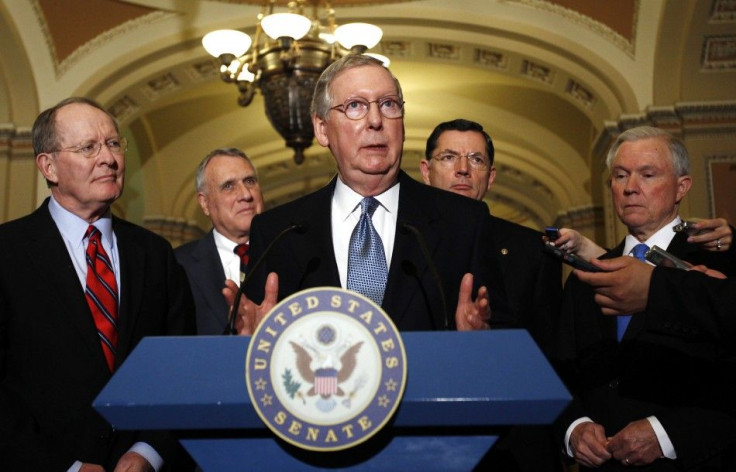McConnell Plan: A Way Out of Debt Deal Crisis?

Does U.S. Senator Mitch McConnell's proposal represent a way out of the debt ceiling stalemate between Congressonal Republicans and President Obama? Perhaps.
McConnell, R-Ky., has proposed legislation that would empower Obaama to raise the U.S. Government's borrowing limit without prior Congressional approval -- something that would avert a U.S. Government default on its bonds/obligations on August 3, The New York Times reported.
The proposal would create a joint committee to draft an enforceable debt-reduction plan, senior officials in each party indicated, The Washington Post reported Wednesday.
Under the proposal, Obama could request increases of up to $2.5 trillion in borrowing authority in three, separate installments over the next 12 moonths, as long as he simultaneously proposed spending cuts of greater size.
However, the potential way-out of the debt deal crisis was immediately denounced by Republican conservatives, who viewed it as the direct opposite of the 2010 election campaign promise to not raise the debt ceiling.
McConnell's proposal occurs one day after Obama said a failure to reach a debt deal that gives the U.S Government the legal authority to rollover its debt and issue new bonds would result in the federal government running out of money. That, Obama said, could jeopardize August Social Security payments to senior citizens.
I cannot guarantee that those checks go out on August 3rd if we haven't resolved this issue, because there may simply not be the money in the coffers to do it, Obama said in an interview with CBS News.
Various political analysts, including New York Times Columnist David Brooks, a Republican, have characterized the Tea Party's stance as more of a psychological protest than a practical, governing alternative.
Republicans argue that Congress should substantially cut government spending to cut the budget deficit. Meanwhile, Democrats insist that revenue increases must be a part of the talks for any meaningful and enduring deficit reduction to occur.
On Aug. 4, the U.S. Treasury Department is due to pay off $30 billion in maturing short-term debt. In theory, the United States could prioritize debt payments, but U.S. Treasury Secretary Timothy Geithner warned lawmakers in Congress that the prioritization tactic would still cause investors to shun U.S. Treasury securities, commonly known as Treasuries.
Geithner has also repeatedly underscored that failing to raise the debt ceiling will have no constructive outcomes for the nation's fiscal condition, the task of deficit reduction, and U.S. and global stock and bond markets.
Major credit rating services S&P, Moody's Investors Service, and Fitch Ratings also have said a failure to raise the debt ceiling may have an adverse effect on global confidence in American securities.
Political/Public Policy Analysis: The devil, as the saying goes, in McConnell's plan lies in the details, but it appears it could avert a U.S. Government default, but that's contingent on Congressional Republicans ability to accept a partial win on the debt limit issue, not an absolute win. President Obama and Congressional Democrats would have to accept the same, in the form of cuts to Medicare and Medicaid, among other program cuts, and possibily a revision of Social Security's benefit formula.
© Copyright IBTimes 2024. All rights reserved.





















